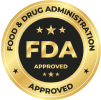Omega-3s are a class of long-chain polyunsaturated fatty acids that are integral to the formation of neuronal cell membranes in the brain and retina. The human body cannot synthesise most omega-3s, relying instead on dietary sources.
There are three main omega-3s: alpha-linolenic acid (ALA), eicosapentaenoic acid (EPA) and docosahexaenoic acid (DHA). Each has its own properties and benefits, but DHA is the most important during pregnancy.
It is the main structural component of the brain, including the cerebral cortex, the outer layer of the human brain that is responsible for higher cognitive behaviour, including speech, language, memory, personality and decision-making. DHA intake is positively correlated with improved pregnancy outcomes, such as length of gestation to term and healthy birth weight, as well as timely completion of developmental milestones after birth. EPA intake is correlated with improved heart health and cholesterol. ALA is not as important a GA for supplementation, and there is little evidence of its usefulness.
Not all omega-3s are created equally. Depending on the source of omega 3 in a supplement, the ratio of DHA, EPA and ALA will be different. Omega 3s from algae, like ours, are highly enriched in DHA. Omega 3s from vegan sources, such as flaxseed oil, chia seed oil or walnut oil, do not contain DHA. Instead, they contain ALA, which is not useful during pregnancy. Always read the label and check the DHA content of your omega-3 supplement.
🎁Recevez Une Boîte GRATUITE d'Oméga 3 Vegan DHA Pour Toute Commande De Plus De 50 CHF - Visitez Notre Shop !
3 for the price of 2! 🎁 Free delivery on all orders – Visit Our Shop!








